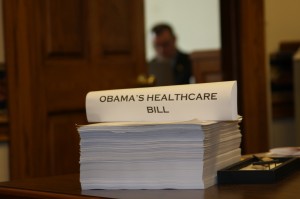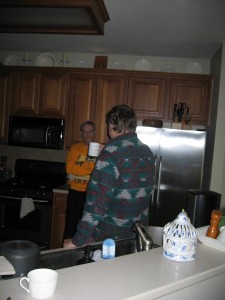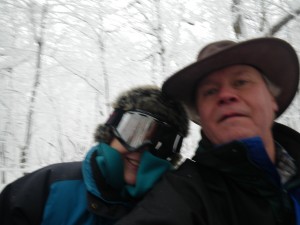March 14, 2013
 I am using a new text in my undergraduate health communication course. The text is edited by Maria Brann, a professor at West Virginia University. It is called, “Contemporary case studies in health communication” and is published by KendallHunt, 2011. The text has a unique approach that is working well to spark discussion in my diverse undergraduate classroom. Each case in the book leaves out the conclusion to the case, so that the class can speculate on the possible endings. Then, as the instructor, I have access to the conclusions written by the case study authors and can share these with the class. We have lively debates about how a case is resolved versus other ways it might have gone. For example, the case that I will discuss with the class tomorrow was written by Dr. Jennifer Ohs, a professor at Saint Louis University. The case discusses medical decision-making and uses the example of an older woman who is deciding whether to have sinus surgery. It is a case used to illustrate problematic integration theory, which is the theory we are discussing in class this week, a framework for understanding proposed by Professor Austin Babrow who is a faculty member at Ohio University. The theory explains why communication may cause us to form judgments that a good outcome is highly unlikely, while a bad outcome is very likely. Other situations that are problematic to integrate with our experiences include situations in which communication makes two options seem to be equal, both in terms of how likely or unlikely they may be and/or how good or bad we judge outcome linked to the option. The case discusses how an older woman considers what her husband, son, and daughter have to say about the surgery, the role of prayer, a friend’s view, and the conversations that her usual doctor and the specialist who would conduct the surgery have with her. In the end, she decides not to have the surgery. It is a good decision for her as it turns out, because she later learns that she needs dental surgery, and having that surgery resolves the issues she was having with her sinuses as well. Of course, she did not know that when she made the decision. Rather she made her decision because her daughter did not offer to come and be with her, because she really wanted a second opinion and her husband would not like to have to drive to the city to see another specialist, and because her son had a similar surgery that did not improve his health much. These were weighed with the doctor’s advice to have the surgery and led to her choice. It will be interesting to see how the class views this case and the ideas they come up with for possible conclusions.
I am using a new text in my undergraduate health communication course. The text is edited by Maria Brann, a professor at West Virginia University. It is called, “Contemporary case studies in health communication” and is published by KendallHunt, 2011. The text has a unique approach that is working well to spark discussion in my diverse undergraduate classroom. Each case in the book leaves out the conclusion to the case, so that the class can speculate on the possible endings. Then, as the instructor, I have access to the conclusions written by the case study authors and can share these with the class. We have lively debates about how a case is resolved versus other ways it might have gone. For example, the case that I will discuss with the class tomorrow was written by Dr. Jennifer Ohs, a professor at Saint Louis University. The case discusses medical decision-making and uses the example of an older woman who is deciding whether to have sinus surgery. It is a case used to illustrate problematic integration theory, which is the theory we are discussing in class this week, a framework for understanding proposed by Professor Austin Babrow who is a faculty member at Ohio University. The theory explains why communication may cause us to form judgments that a good outcome is highly unlikely, while a bad outcome is very likely. Other situations that are problematic to integrate with our experiences include situations in which communication makes two options seem to be equal, both in terms of how likely or unlikely they may be and/or how good or bad we judge outcome linked to the option. The case discusses how an older woman considers what her husband, son, and daughter have to say about the surgery, the role of prayer, a friend’s view, and the conversations that her usual doctor and the specialist who would conduct the surgery have with her. In the end, she decides not to have the surgery. It is a good decision for her as it turns out, because she later learns that she needs dental surgery, and having that surgery resolves the issues she was having with her sinuses as well. Of course, she did not know that when she made the decision. Rather she made her decision because her daughter did not offer to come and be with her, because she really wanted a second opinion and her husband would not like to have to drive to the city to see another specialist, and because her son had a similar surgery that did not improve his health much. These were weighed with the doctor’s advice to have the surgery and led to her choice. It will be interesting to see how the class views this case and the ideas they come up with for possible conclusions.









 I noticed something during the waiting in the airport. Whether I wanted to eavesdrop or not, the crowded conditions and the accessbility of cell phones presented me with endless conversations among family members. Mostly they were keeping each other posted on flight delays and revised plans. But in so many cases, there was talk about how someone in the family was feeling now or whether someone in the family was well enough to be present for the holiday or if there was any news about a loved one’s recovery. In one case, a distressed young woman was talking to someone close to her about a mother’s drug and alcohol recovery. We got up and moved out of the mass of people in this case to avoid hearing so much of what was clearly painful to her. She moved as far as she could from the throngs. But there was just only so much space.
I noticed something during the waiting in the airport. Whether I wanted to eavesdrop or not, the crowded conditions and the accessbility of cell phones presented me with endless conversations among family members. Mostly they were keeping each other posted on flight delays and revised plans. But in so many cases, there was talk about how someone in the family was feeling now or whether someone in the family was well enough to be present for the holiday or if there was any news about a loved one’s recovery. In one case, a distressed young woman was talking to someone close to her about a mother’s drug and alcohol recovery. We got up and moved out of the mass of people in this case to avoid hearing so much of what was clearly painful to her. She moved as far as she could from the throngs. But there was just only so much space.